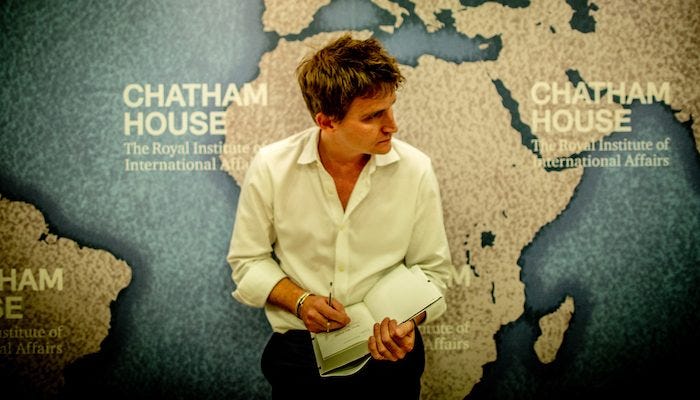You can listen to the Lowdown on Apple (via the player above) Spotify, Android, Amazon, and every other podcast host
In February 2022, everyone who thought they knew what they were talking about predicted that Russia’s invasion of Ukraine would be over in days. So convinced was conventional wisdom that Russia was an unstoppable military superpower, the US offered to fly Volodymyr Zelenskyy out of Kyiv.
Overestimating Russian strength was an intelligence failure as bad as the US and UK believing that Saddam Hussein had weapons of mass destruction. It stopped the West arming Ukraine in the 2010s. (If Russia could win any conflict, what was the point?) Tens of thousands have died as a result.
One of the few people to call the war right was Mike Martin. He noticed the awful equipment and lousy tactics of the corrupt and ill-led Russian military and said from the start that they would never conquer Ukraine.
Mike served with the British army in Afghanistan, where he worked for four commanders of the UK’s Task Force Helmand, advising them on local population dynamics. He is a visiting fellow at King’s College, London, and the author of the excellent study of human violence Why We Fight and of the recent How to Fight a War, which in a sign of the times has just found a German publisher
I was delighted to bring an original military thinker on to the Lowdown. I began by asking Mike about the failures of Western intelligence.
How did we get it so wrong?
Mike Martin: “If you're an intelligence analyst trying to understand an opponent, the most common thing that you do is mirror. You understand the enemy through your own eyes. [And fit it] into the framework that you have of how you understand yourself.”
I should explain that “mirroring” is the cognitive bias that occurs when you project your own beliefs onto others. In the case of Russia, Western military analysts saw that Putin had so many men under arms, and so many tanks and aircraft and they assumed that his armies had the same capabilities as Western forces; they assumed, indeed, that Russia was still a miliary superpower, as that is what it looked like on paper.
“The saw war as a spread sheet,” as Martin put it.
Martin’s preferred approach to analysing conflict is easy to describe but exceptionally hard to do.
“I don't think war is a spreadsheet,” he told me. “I think war is a conversation. It's about psychology. It’s about how good your strategy is, what the morale of your forces is like, how well trained are they, and how good your logistics system is.
“[It’s about] really boring stuff like, can you get underpants to the front line from a factory in Siberia. And on those measures, on those intangible measures that you can't see on a spreadsheet, the Russian military was just totally ineffective. Very poor morale, very poor training, logistics system doesn't work. And a large part of that is because of the really high levels of corruption. So expensive military tyres have been swapped out for cheap ones, and the rest of the money has gone into the procurement officer's bank account.”
OK, you might say. Fine. With hindsight I accept that a handful of dissident commentators like Mike and Professor Phillips O’Brien of St Andrews University were right and Western militaries and the regiment of military pundits who march across the airwaves were wrong.
But is there a danger now of making the opposite mistake of underestimating Russia and overestimating Ukraine’s military strength?
Are we underestimating Russia?
Putin is engaged in a colonial war. But Russia is not in the same position as the British in Kenya, or the French in Algeria, or of first the French and then the Americans in Vietnam. It is not fighting thousands of miles from home. Russia is occupying territory in a neighbouring state and can launch attacks on Ukraine from across the border indefinitely.
Like other pro-Ukrainian commentators, I sensed that Mike Martin was not as optimistic as he had been in the summer. But he was by no means a pessimist. Here is how he saw the battlefield.
“There's no way that Russia can win this war, but perhaps the best it can achieve is to fight it to a stalemate. And conversely, have a look at the Ukrainian side, and certainly, momentum is with them. They're taking territory from the Russians. The Russians are having to respond to them. We see that in the [Ukrainian] attacks in Crimea, targeting of the Russian fleet, and Ukraine taking out Russian air defences.
“Probably the worst-case scenario is some sort of stalemate. That is the worst-case scenario for Ukraine, but the best-case scenario for Russia… But again, I think, come back to those intangibles, strategy, morale, logistics
If you look at a map of Ukraine, you imagine that the Ukrainian armed forces need to strike south to the sea and divide the enemy army in two. But Mike points out that the Ukrainians don’t need to reach the coast. They need only advance to a position where their missiles and long-range artillery can target the road and rail supply lines to the Russian front line
“Thousands of tons a day are required to sustain the Russian forces, and there are just two routes. The railway junction at Tokmak is already under, massed Ukrainian artillery fire.
Keep reading with a 7-day free trial
Subscribe to Writing from London to keep reading this post and get 7 days of free access to the full post archives.





